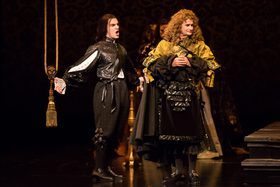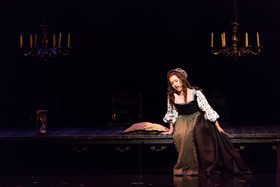|
Back
Floyd's Prince Fails to Command Houston
Cullen Theater, Wortham Theater Center
03/05/2016 - & March 11*, 13, 2016
Carlisle Floyd: Prince of Players
Ben Edquist (Edward Kynaston), Federico De Michelis (Thomas Betterton), Chris Bozeka (Male Emilia), Chad Shelton (Charles II), Christopher Childress (Staff Member), Sofia Selowsky (Nell Gwynn), Megan Mikailovna Samarin (Lady Meresvale/Mistress Revels), Pureum Jo (Miss Frayne), Mane Galoyan (Margaret Hughes), Joseph Evans (Sir Charles Sedley), Scott Quinn (Villiers, Duke of Buckingham), Saïd Henry Pressley (Hyde), Megan Berti (Female Emilia)
Houston Grand Opera Orchestra, Patrick Summers (conductor)
Michael Gielata (director), Shoko Kambara (set designer), Gregory Gale (costume designer), Renée Brode (lighting designer) 
B. Edquist, J. Evans (© Lynn Lane)
Carlisle Floyd, without a doubt an important name in American—and Houstonian—opera, has suffered something of a curse in never being able to replicate the success of his 1955 Susannah. Unfortunately, Prince of Players, his fifth world premiere by Houston Grand Opera, continues that trend.
Prince of Players is quite different from previous Floyd operas in setting and themes. While previous works invariably centered around American locales and situations, the new opera transports us to Restoration England and attempts to confront some timely issues, gender identity being the most obvious. Based on Jeffrey Hatcher’s play Compleat Female Stage Beauty, already adapted into a 2004 movie starring Billy Crudup and Claire Danes, the plot turns on Edward Kynaston’s career as an actor, portraying female roles on England’s stages before females themselves were legally permitted to. The short opera explores Kynaston’s sexuality, his crisis when Charles II decrees that females be allowed to act, and, in a disappointing and confusing development, his transition to cisnormativity, which somehow allows him to accept that a man should act as a man.

M. Galoyan (© Lynn Lane)
It must be said that the technical performance of the opera is very strong. The large cast is filled out mostly by current and former members of the Houston Grand Opera Studio, a legendary training program developed in part by the composer. As Kynaston and Margaret (referred to as “Peg” in the opera), Ben Edquist and Mane Galoyan are wonderfully cast, and sing Floyd’s disjunct lines with ease. Other roles are likewise successful, with standouts coming from Pureum Jo’s coquettish Miss Frayne, Scott Quinn’s Duke of Buckingham, and veteran Joseph Evans’ sniveling Sir Charles Sedley. Patrick Summers coaxes as much momentum as possible out of Floyd’s score, which always hovers in the same tempo range, and the orchestra do their best to enrich the thin orchestration. Sets and costumes are largely referential, but serve their purpose well.
Strong performances can’t save the confused and confusing libretto, however. Explorations of Kynaston’s traumatic upbringing, which could have been used to create a complex, sympathetic character, are given short shrift and come across as excuses for Kynaston’s “abnormal” sexuality. While Kynaston’s and Peg’s lives undergo tremendous personal and professional transformation, the remainder of the cast goes on its merry way, oblivious and unaffected.
Musically, too, the opera fails to compel. The one memorable aria from the opera is a salon set-piece, given to Kynaston, now performing in drag as “Lusty Louise”; it brings to mind Les Misérables “Master of the House” with its one-dimensional crassness. Certainly something deeper and more nuanced, balancing bawdiness with critical commentary, could have been made of this moment. Otherwise, the libretto is delivered as endless recitative, while the orchestral writing borrows heavily from Britten (minus the memorable melodic lines), with some jazz-inflected allusions to mid-century American composers (Walter Piston, Roy Harris) along the way.
It’s impossible to know what the takeaway from this opera is supposed to be. Is it that traditional gender roles—men as men and women as women—are, in the end, the only ones that lead to a happy life? Is it that a woman (Peg) seeking validation in her career ambitions needs to physically seduce and then rely upon the professional expertise of a man (Kynaston) to achieve that validation? In recent years, discussion of issues central to the opera’s plot have become much deeper and more honest, but we don’t get depth or honesty here. Floyd has already taken many liberties with the source material. His failure to extend these liberties and create a nuanced reflection of contemporary societal issues reflected through a moment in British history is the most disappointing aspect of the piece.
Marcus Karl Maroney
|